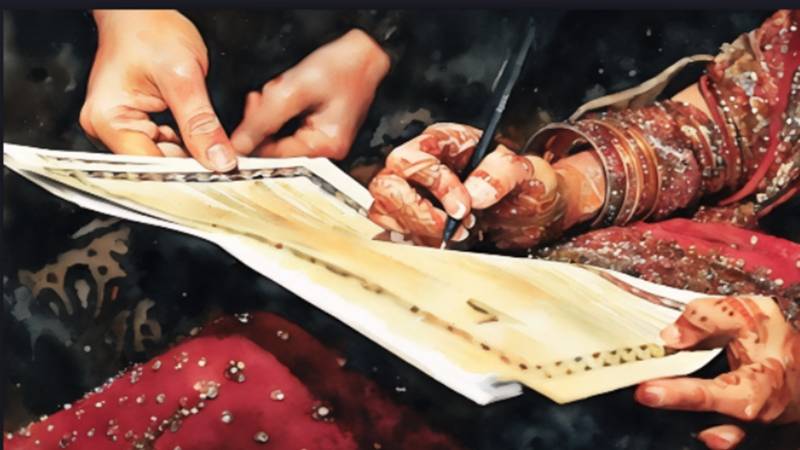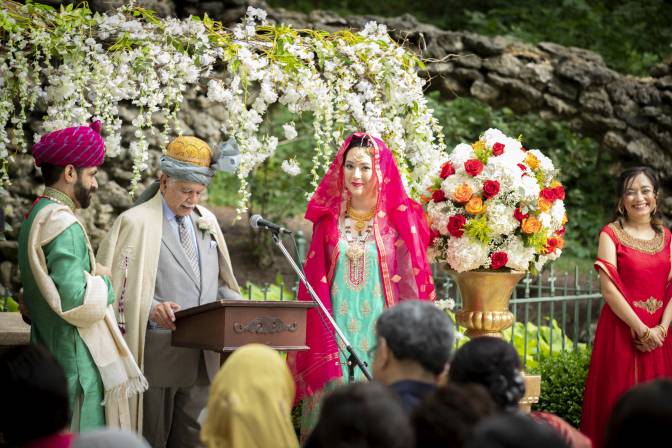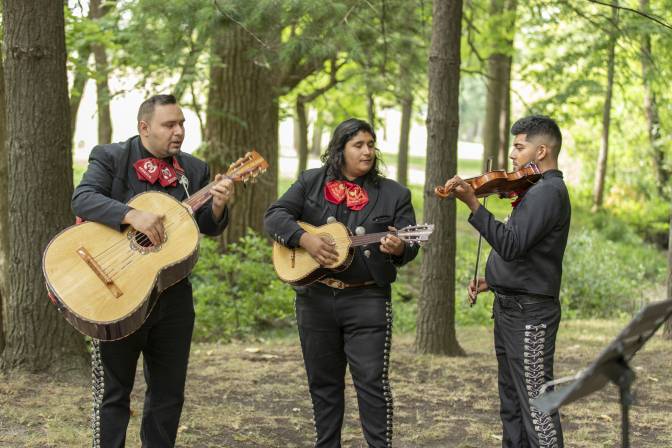
Recently I attended a mixed marriage. The bride was Pakistani American, and the groom was of Taiwanese ancestry. As is the wont with us Pakistanis, we try to impart our culture, dress and religion on others. So was the case here.
The groom wore Pakistani dress at the reception. His parents and a few members of his family were dressed in simple Western clothes. The music played at the reception was desi and so was the food. There was no effort made to be inclusive and have some representation of the groom’s culture and traditions. During the reception, I did not see a single desi try to talk to the groom’s family except members of the bride’s family.
Unfortunately, I have seen this movie many times before.
I often wonder as to why are we so afraid of embracing the traditions of other people even when they have by marriage become part of a desi family. Why should they be obliged to abandon their own millennia-old traditions and religion to appease the mother and father of the groom? I would have loved to see some items of Chinese cuisine along with biryani, chicken kabobs, and eight different kinds of curries at the wedding. And some wedding tunes from groom’s culture.
About 30 years ago, the daughter of a friend of mine asked if I would consider performing her nikkah. I said I was not licensed to perform marriages in the State of Ohio. I could perform a religious marriage, but it would not be legal under the Ohio law. She said she would have a civil ceremony in the office of a Justice of the Peace to give it a legal thrust but insisted that I officiate at her nikkah.

I asked her as to why was she adamant in not having a regular imam perform the nikkah. She said that most imams are extremely serious and somber and they start preaching during the ceremony. “They are very good at turning a joyous occasion into a sombre occasion,” she said.
She had a point.
There are many uplifting themes in the Quran and Hadith. How about talking about a husband’s duties towards his wife rather than turning it around? Instead of considering the wife as property, why not consider her an equal partner?
The groom’s family had brought with them an ornate and beautifully decorated nikkah nama that is a tradition in the valley of Kashmir. Since the bride and groom both were of Kashmiri background, it was a fitting addition to the ceremony.
After I performed the first nikkah other requests followed from girls from within our Pakistani-Muslim community, I went ahead and obtained a license to perform legal marriages in the State of Ohio.
The license gives me the option to perform marriages no matter what the religion of the couple. Or no religion.
In mixed marriages across cultural and religious divides, I meet with the couple to ascertain if there is a conversion involved. In case there is conversion, I want to make sure the conversion is real and sincere and not for show. And I make sure they are free to express their individual culture during the ceremony if they prefer.
I consider myself a believing and practicing Muslim who stands a bit left of centre. While I try to accommodate couples to the best of my ability, I will not bend or break the injunctions laid out by my faith
A Kashmiri couple, dear friends, requested me to perform the marriage of their son who was marrying a girl from South American background. I advised my friends to consider having some Latino music and tell their desi friends to be considerate of the bride’s Spanish-speaking family. For I have seen desi people stick with each other and ignore the presence of non-desis among them.
A Latino mariachi band was hired that welcomed the arriving guests with Spanish tunes and later at the reception walked around the venue and serenaded the guests. During the ceremony, I asked the bride’s sister to read an appropriate Spanish poem which she did by reading a poem of the famous Spanish poet Pablo Neruda. Thus, Spanish culture and music was incorporated seamlessly with desi culture.

I consider myself a believing and practicing Muslim who stands a bit left of centre. While I try to accommodate couples to the best of my ability, I will not bend or break the injunctions laid out by my faith. In case I am confronted with such a dilemma, I will offer to perform a non-religious ceremony.
I am neither qualified nor smart enough to understand certain injunctions. I am not a taqleedi (following blindly the traditions) but at the same time I profess my lack of comprehension of certain injunctions. A Muslim man can marry a Jewish or Christian woman (because they are from People of the Book) but a Muslim woman can’t marry a Jew or a Christian. Ulema would give all kinds of explanations, but in my mind none of them stick. The only explanation is that the Scripture says so. And so be it.
Such a dilemma was posed back in 2001 when the daughter of very close friend of mine asked me to perform her nikkah. She had fallen in love with a Swiss man. I laid out the options for her. She opted for a Muslim ceremony and her fiancé agreed willingly to convert. The wedding took place in a beautiful villa on the shores of Lake Como in Italy.
And then there was a request to perform a marriage in a vineyard in California. And in the lobby of a hotel in Ohio.
Marriages are not made in heaven but on this earth. Couples have to commit to each other and also to some extent to their in-laws. I have heard that in Saudi Arabia many people think of marriages as a disposable commodity. Just imagine: King Saud sired 40 sons and perhaps as many daughters. It boggles the mind to think about the number of women he married to be able to have that kind of productivity. To me he (and many of his successors) made mockery of the institution of marriage. But at any given time, he had only four wives and when some other desirable women entered the picture, out went one of the four wives. Go figure how he maintained the sanctity of marriage and family life?
In my unusual tenure as a nikkah khwan, there have been some hilarious moments. Months after I performed the nikkah of a girl from a local Punjabi family, the mother asked me, in one of the community events, about the customs surrounding nikkah in Peshawar. I told her that in our area, after nikkah, the family gives a gift to the nikkah khwan. She asked “What kind of gift?” I answered, “It is usually a lungi.”
She was surprised and asked whether if she got a lungi for me, I would wear it. “Of course I will,” I answered. “It is a tradition in our part of the country that men wear a lungi wrapped around a kulla,” I added. She blushed and laughed, and before she could misconstrue my remarks, I explained that the Kulla is a headgear, and lungi is wrapped around it. It is like a pagri. We both had a good laugh. In Punjab, the loin cloth or sarang is called lungi, whereas on the old Frontier, people make it a little more respectable by using it as part of the headgear!

